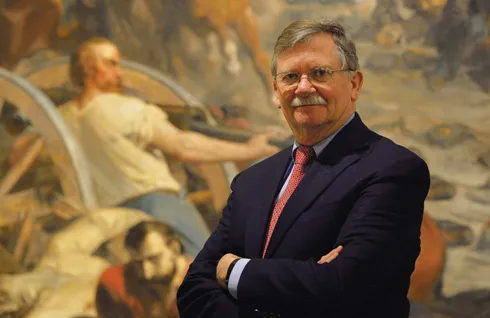Jim Vaughan

Of all the dignitaries, supporters and Civil War enthusiasts gathered at Lee’s Headquarters in Gettysburg for the Trust’s announcement on July 1, few understood the significance of the site to the Commonwealth of Pennsylvania better than James Vaughan. After years working in a variety of roles across the historic preservation community, from New Hampshire to Tennessee, this dedicated public servant has found an ideal home as Executive Director of the Pennsylvania Historical and Museum Commission (PHMC) and as State Historic Preservation Officer, a position from which he played a key role in supporting the Trust’s initiative.
As head of the PHMC, Vaughan is responsible for a vast array of historic sites across the Commonwealth — from the Drake Oil Well, the first active oil well in the United States, to the Revolutionary War’s Brandywine Battlefield outside Philadelphia. He also serves as the final voice on historic preservation in Pennsylvania, and leads the charge to secure funding for Keystone State landmarks in the state’s budget.
Despite his passion for the Commonwealth of Pennsylvania, Vaughan says he didn’t always plan on a career in preservation. “I was pursuing a degree in American history at the University of New Hampshire,” he recounts. “Right after I passed my doctoral exams, I went to work for the Strawberry Banke, Inc. I found working with preservation and historic museums fascinating.” Since then, he has been director of a number of historic sites, including The Hermitage, the Tennessee home of President Andrew Jackson, and the San Diego Historical Society in California. “At each one,” he says, “I’ve learned a little something new about historic preservation.” Prior to his current appointment in Pennsylvania, he served as vice president of stewardship of historic sites for the National Trust for Historic Preservation in Washington, D.C. “I had to be pulled out of retirement for this one,” he jokes.
Because of Pennsylvania’s profound role in the story of America — highlighted by such momentous sites as Independence Hall, Gettysburg and the Flight 93 Memorial, just to name a few — Vaughan believes the Commonwealth has a responsibility to preserve its heritage. And communities receive a boost in the form of heritage tourism for doing so. “Main Street programs have had a huge impact,” he says. “The number of people that have visited Gettysburg — especially throughout the sesquicentennial — have had a huge impact. Culturally and educationally, we serve well over 100,000 schoolchildren each year. We have museums and historic sites throughout the state, including some of the largest museums outside of Philadelphia and Pittsburgh that do a good job of bringing our history and culture to the public.”
Vaughan also recognizes the significance of Gettysburg — both historically and economically. He says his office has always had a close relationship with Gettysburg National Military Park and the local community. But he notes the reach of the Civil War in Pennsylvania goes beyond just this one battlefield. “A number of years before the anniversary of the battle, PHMC, the Pennsylvania Historical Society and the Heinz History Center in Pittsburgh put together a statewide Civil War 150th Advisory Board,” he says. “Over the course of the last four years, that group has been engaged in public programs around the state related to the Civil War, published two volumes on the Civil War in Pennsylvania and put together a travelling history exhibit, which has circulated to a number of smaller communities and towns over the past couple of years.” Vaughan and his staff have also worked on a comprehensive Civil War exhibit at the State History Museum in Harrisburg, which displays relics and treasures passed to the museum from veterans of the war and their families.
Realizing the significance of Lee’s Headquarters to the story of Gettysburg, Vaughan and his staff supported the Civil War Trust in the acquisition of the property. “Without question, we are grateful for Jim Vaughan and his staff,” said Jim Lighthizer, President of the Civil War Trust. “We know that without their help at the state level, this deal would not have been possible.”
Vaughan sees the role of the PHMC as the steward of the historic treasures in Pennsylvania, especially at Gettysburg. “We also want to do what we can to assist the Civil War Trust in preserving and interpreting more of the Gettysburg Battlefield,” he noted.
Even with so much history to protect in Pennsylvania, Vaughan sees Gettysburg as one of his top priorities. “I agree with Ken Burns — the Civil War was the defining moment in American history. It tells us more about who we are than any other single event.”
After years working in the preservation field, Vaughan is very pleased to be sharing his expertise in Pennsylvania. “The reason I’m in this field is because, in a democracy, people need to know their history,” he said. “You look at our contemporary issues, you look at the impact of civil wars in other parts of the world right now, and it would be hard to understand American history without some understanding of the Civil War.”


